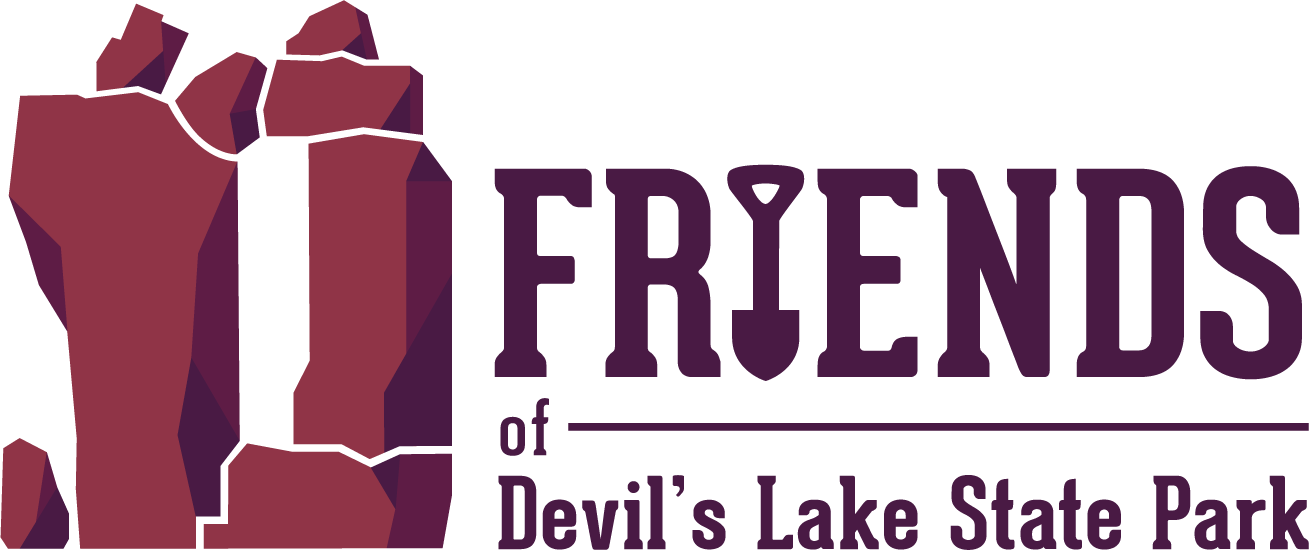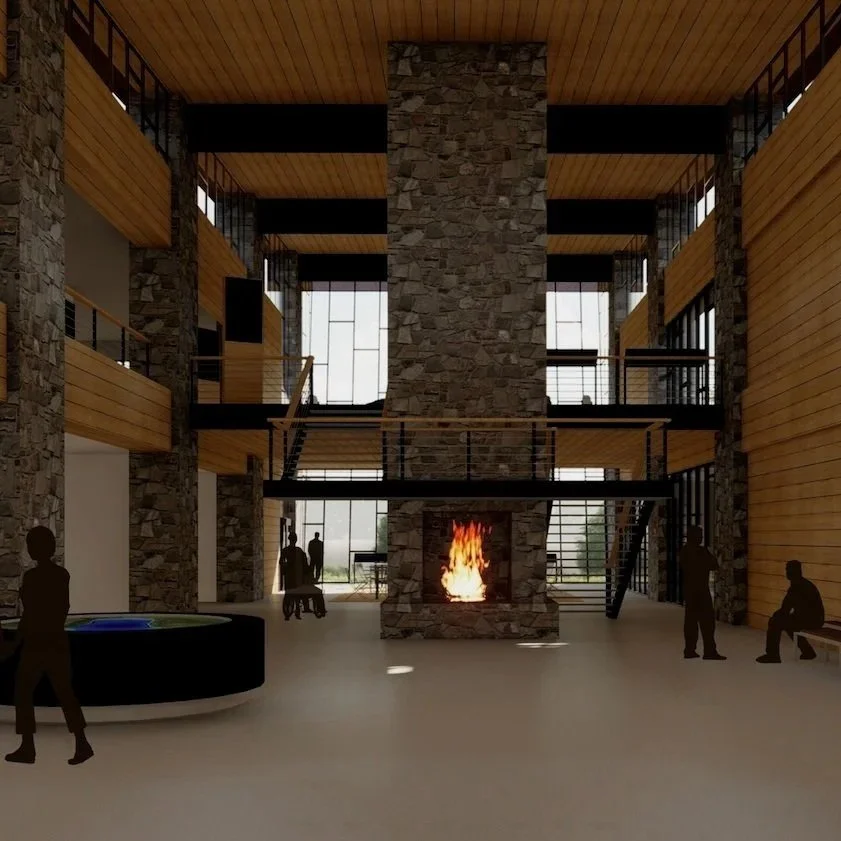Ignite Curiosity
Foster Stewardship
Inspire for Tomorrow
Foster Stewardship
Inspire for Tomorrow
Our Vision: Features and Goals
A center powering knowledge and understanding
This multi-use center will support events and gatherings rain or shine, day or night, and through all four seasons. It will include dynamic elements that will enrich visitors' experiences, enhance park operations, and serve community residents. With an emphasis on education, it will be versatile, filling a void in the park's infrastructure and offerings as well as accommodating a variety of functions for area residents and visitors alike.
Interactive and interpretive exhibits for all ages, educational spaces, outdoor recreation displays, a café, gift shop, and administrative space for park staff are planned. An expansive viewing deck accessible to all abilities, outdoor play spaces, class areas, and interpretation spaces will surround the exterior of the building. Incorporating cutting-edge technology and resources, the new center will offer dynamic exhibits to enhance the experience of park visitors year-round, making it an exciting destination for visitors, students, and educators alike.
The Interpretive Center will also bring new opportunities for rentals, outdoor recreation experiences and challenges, workshops, presentations, and gatherings – regardless of weather or season. It will be a welcoming place that supports inclusion and diversity, encouraging participation and presenting opportunities to try new things, have new and exciting experiences, take a break from modern-world distractions, and learn about the wild world around us. Importantly, it will instill the next generation with values of conservation and care for the park and for the planet.
-
Interactive multimedia exhibits and educational spaces
Proximity to natural resources and historical resources
Outdoor learning areas
Scenic views of the lake, bluffs & trails accessible to all
Design harmonizing with the landscape and existing buildings
Connections between camping and day-use areas
Year-round restrooms
Access for pedestrians and cyclists
Quality sustainable, energy-efficient building materials and systems
Administration space including offices, storage, and program preparation space
Community gathering space
Embracing Sustainability with Thoughtful Design
A center designed to promote stewardship must apply best practices to ensure that the park and its resources are protected – and that’s the plan. The center will employ sustainable practices and building materials to minimize environmental impact. Its thoughtful design will also maintain the scenic and visual quality of the park.
-
Enrich the visitor experience while promoting stewardship and appreciation of park resources.
Inspire lifelong learning, ignite curiosity, and foster connection with Devil’s Lake State Park and the entire state park system.
Provide much needed year-round amenities for park visitors and employees.
Serve as a catalyst in creating opportunities for learning and growth so visitors can make their own intellectual and emotional connections to the park’s many resources.
Offer opportunities for expanded collaboration with schools, community, family, youth, and adult organizations to use this resource as a unique educational classroom.
Meet the needs of current visitors and encourage them to explore other areas of the state to lessen visitor impact on Devil’s Lake while encouraging visitorship of other Wisconsin parks.
The new center will provide experiential learning opportunities about the Ice Age as it relates to Devil’s Lake State Park and the region. This story is particularly important when we consider the dramatic acceleration of global climate change trends today.
-
The new center will also highlight increased understanding of the historical and cultural context for the region and the park. For thousands of years, Native American tribes have lived in the beautiful area of marshes, bluffs, hills, and rivers that is home to Devil’s Lake State Park. The Ho-Chunk Nation (Winnebago), Fox, Sauk, and Kickapoo Native American tribes were early inhabitants of the area and their stories, language, and traditions must be carried on.
This project aims to honor and respect the past and future for those who have lived in south-central Wisconsin, and still do, while integrating the important roles of the many dedicated descendants who continue working hard today to share their knowledge and preserve their legacy.
Exhibits will highlight area Native American culture and the sacred significance of the park's effigy and other mounds. The effigy mounds will continue to be preserved and protected, and the center will promote respect and care of these historic features.
A correct, complete and respectful record of indigenous peoples – dating back to prehistory – will be enshrined at this center and conveyed with dignity and passion to all park visitors. It will illuminate that history and the pivotal role this place played then, and plays now, in the cultural and spiritual heart of area Native Americans.
In addition, the center presents an opportunity to preserve the native languages of the area through various means, such as incorporating signage in multiple languages, hosting language classes or workshops, and creating educational resources that promote the use and preservation of indigenous languages.
About the Campaign
Dating back more than 40 years, the vision for this project has been a long time in the making. It is a major undertaking that will serve as an outstanding and unparalleled resource, bringing numerous benefits to the park, the region, and the state of Wisconsin.
But we can’t do it alone!
To reach our ambitious $18 million goal, we require the support of everyone, ranging from individuals to businesses. Every contribution brings us closer to transforming this vision into a reality.
-
This project is a collaborative effort between the Friends of Devil’s Lake State Park, the Devil’s Lake Concessions Corporation, and the Wisconsin Department of Natural Resources.
Our campaign kicked off in August 2021. Our focus is to raise awareness about the project and inspire park lovers to get involved.
Funding for the campaign is anticipated to be derived from the generosity of individual donors, foundation grants, and state or federal funding sources. Given the park’s immense popularity, our campaign support outreach extends to regional and national donors, as well as park visitors
We believe this new center will be a beacon of inspiration, education, and preservation, providing an invaluable resource for all who appreciate the majesty of Devil's Lake State Park. Join us in making this vision a reality by contributing to the Campaign for America's State Park today.
Give to the Campaign
Donor Recognition
Opportunities
Tribute / Memorial
Dedication Pavers
Monthly Giving
Anticipated Additional Benefits of the Project
-
The center will attract visitors, provide quality educational experiences for all ages, and promote healthy recreational opportunities, while instilling values of conservation and care for the park and the planet.
The facility itself will be both purpose-built and adaptable to meet a number of space-use needs for visiting students, youth and other groups, as well as the community at large. It will bring new opportunities to the area for rentals, outdoor recreation experiences and challenges, workshops, presentations, and gatherings – regardless of weather or season.
From local park lovers and out of state visitors to the businesses and companies that operate in the state – all of Wisconsin will benefit from its creation and impressive array of program activities. It will undoubtedly contribute to the excellent quality of life that attracts new residents, retains our workforce, and makes Wisconsin such a wonderful place for us all to call home.
-
This new center will help us strategically meet the needs of park visitors, while providing an opportunity to lessen impact on Devil’s Lake by inspiring visitors to explore other areas of our great state.
In addition, the interpretive center will support and be a kick-off hub for activities and initiatives that improve the park, such as trail improvement and maintenance, invasive species management, and other conservation efforts that promote the preservation and enjoyment of the park's natural resources.
The interpretive center will provide dynamic, vibrant, and essential support in fulfilling the park’s mission. By facilitating meaningful and enriching park experiences, the new center will play a mission-critical role – to instill stewardship and help visitors understand the historical, spiritual, cultural, and geological significance of the park so they will want to help care for those resources for generations to come.
-
The new center will serve as an outdoor recreation educational resource and hub within Devil’s Lake State Park, introducing visitors to the Baraboo Hills region, the entire Wisconsin State Park System, and our state’s numerous other nationally significant recreational, natural, and cultural treasures; a “gateway” by which visitors can venture outward.
As a way to lessen impact on Devil’s Lake and encourage visitors to explore other areas of the state, the center will highlight the Baraboo Hills region and Wisconsin's other state parks and nationally significant recreational, natural, and cultural treasures.
It will inspire tourists and residents to venture beyond Devil’s Lake, promoting the vital tourism economies of nearby areas, like Wisconsin Dells, but also lesser visited, more far reaching places in the state.
-
The new interpretive center will directly create several new job opportunities within the park. These jobs will be needed to manage various amenities, including a cafeteria, gift shop, and most notably, the interpretive exhibits and educational resources.
The center will also feature a large welcome area with a staffed desk, and require additional staff for day-to-day operations and upkeep.
The increased number of programs and ability to host events throughout the day, no matter the weather, will also require additional staffing and additional educators. As a result, the center's various components will generate a need for additional staff within the park.
Not only will there be a significant number of jobs created as a result of this new facility, many of them will be year-round positions rather than seasonal.
By utilizing local contractors and building supplies wherever possible, the construction of the new $18 million facility will support numerous businesses and create job opportunities, ultimately contributing to the growth of the local economy while ensuring that the money stays within Wisconsin.
The new interpretive center is expected to attract visitors to the area year-round, creating a demand for various goods and services. As a result, the local economy will benefit from indirect job creation that will support the growth of this four-season tourism destination. Visitors will have the opportunity to enjoy local restaurants, shop at nearby stores, and utilize other services provided by the area's workforce.
In turn, the jobs and the economic activity they engender will generate state and local taxes.
-
In 2022, Wisconsin's outdoor recreation industry marked a record-setting contribution of $9.8 billion to the state's GDP. As Gov. Evers noted, “Outdoor recreation is part of who we are as a people and a state—it improves our quality of life, draws visitors from all over the world, supports tens of thousands, and serves as a major economic driver.”
The industry supported nearly 90,000 jobs across various sectors in 2021, reflecting a 9.7% growth rate. Even amidst pandemic supply chain issues, manufacturing jobs, which accounted for 10% of all outdoor recreation jobs, increased by 11%.
Tourism and local trips notably contributed nearly $2.8 billion to the GDP, with local trips' economic impact rising by 7.2% to $771 million in 2021. The anticipated Devil’s Lake educational and interpretive center is poised to further this growth by drawing visitors and promoting outdoor recreation.
As Anne Sayers, Wisconsin Department of Tourism Secretary, says, “Our traveler surveys consistently show outdoor recreation is a top marketable reason people visit Wisconsin. Supporting the entire outdoor recreation industry is essential.”
Finally, it's important to note that tourism in Sauk County alone generated $1.48 billion and supported more than 11,000 jobs in 2021. Clear evidence of the significant role Devil's Lake State Park plays in driving this success.







